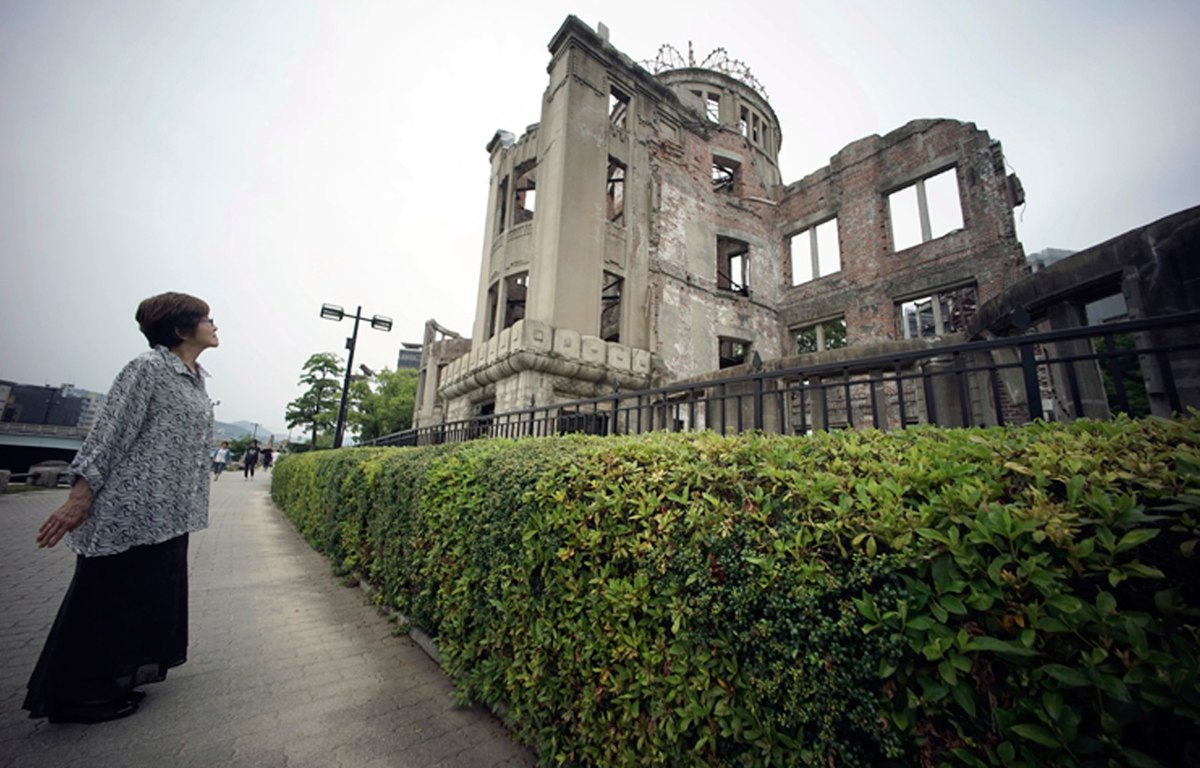This week marks the seventieth anniversary of the dropping of an atomic bomb on Hiroshima.
At least sixty thousand Japanese civilians were killed instantly. Three days later another atom bomb was dropped on the city of Nagasaki and killed around forty thousand. No nuclear weapon has been used since. But how good a job are we doing of making sure that they will never be used again?
The American president, Harry Truman, always maintained that it had not been an especially difficult decision to authorise the use of the atom bomb in the summer of 1945. The United States had (just) won the race to develop the world’s first. Recent historical research has confirmed that Hitler had not been far behind by the time Germany was overwhelmed by Soviet forces in the spring of that year. Truman believed that using this new, devastating weapon would bring the war against Japan to a quick end. It would save the lives of a million American servicemen who would otherwise have to fight their way to victory against an enemy determined never to surrender. That belief was borne out by events. Nine days after Hiroshima Japan surrendered. Its emperor, Hirohito, announced in an unprecedented broadcast to his people, that ‘the war situation has developed not necessarily to Japan’s advantage’.
But despite that, his decision has always been controversial. That is partly because of the huge cost inflicted on the Japanese people. In addition to those killed instantly, tens of thousands died subsequently from radiation poisoning. It’s also because the unleashing of nuclear weapons seemed to many to take warfare into a wholly new dimension, one in which the very future of mankind seemed now in jeopardy.
So the imperative to rid the world of nuclear weapons was born at the moment the first bomb was dropped on Hiroshima. Yet the world contains more nuclear weapons today than probably anyone imagined possible seventy years ago.
Proponents of nuclear weapons argue that their existence has actually proved to be a very good thing. Their point is that their value lies not in their being used but in their deterrent effect: the consequence of unleashing them is so unimaginably awful that no one would dream of using them so long as they knew that those consequences would fall on themselves just as much as on their adversaries. So the doctrine of mutually assured destruction was born.
Furthermore, they argue, the world has been pretty successful in the last seventy years in limiting the spread of nuclear weapons to just a handful of states. The non-proliferation treaties have seen to that.
Nonetheless, progress in removing the nuclear threat has been far more limited than was hoped for and expected twenty years ago. Before then the great nuclear stand-off had been between the Soviet Union on one side and the western countries of NATO, led by the United States, on the other. Both sides in this Cold War bristled with nuclear missiles. But the collapse of the Soviet Union and the apparent ending of the Cold War led many to believe that the dismantling of this threatening nuclear armoury could now rapidly be achieved.
It’s true that each side has reduced the number of its nuclear weapons. But hopes that they would get rid of them altogether have long gone. The West sees Russia as reverting to type, throwing its weight around in its ‘near-abroad’, in countries such as Ukraine and the Baltic states, and announcing, last year, a revamp of its nuclear arsenal. Russia sees NATO as expansionary in its old sphere of influence and therefore constituting a threat that has to be confronted.
Nor is the apparent success of non-proliferation sufficient to make us all feel we can sleep easily in our beds. The maverick and unpredictable regime in North Korea alone is enough to give us nightmares. Not everyone believes deterrence would stop it acting insanely with its nuclear weapons if it set its mind on doing so. India and Pakistan remain nuclear powers facing each other in a state of permanently brittle animosity.
Even the cases of those former nuclear states that have given up their weapons give little cause for cheer. It’s true that South Africa may have done so without adverse consequence, but the case of Ukraine seems hardly likely to encourage others to do the same. Ukraine agreed to dispose of the nuclear weapons on its soil when it was a part of the Soviet Union in return for international guarantees (signed by, among others, Britain) that its territorial integrity would be honoured. Yet no one lifted a finger to honour these guarantees when Russia walked into Ukrainian Crimea and took it over.
It is possible to be a little more optimistic with regard to Iran because of the recent deal struck between Tehran and world powers led by the United States to stop Iran building a nuclear weapon system. Iran has always denied it wanted to do any such thing, though few people believed it - not least because they looked at Iran’s geo-political predicament of being surrounded by nuclear powers such as China, Pakistan and, most of all, Israel, and concluded Iran would be bound to want to join the club.
President Obama claims the new deal at the very least puts this off for a decade and carries the hope that it can be prevented indefinitely. But those who oppose the deal, especially Israel, think the opposite. They argue that Iran’s economy will grow because of the lifting of economic sanctions and they will be in an even stronger position ultimately to go nuclear. If that does happen, they say, others in the Middle East, notably Iran’s great enemy, Saudi Arabia, will do the same and a new nuclear tinderbox will have been created. In other words, the nuclear-armed world is becoming more, not less, dangerous.
Where does this leave Britain? The main parties have all argued recently for Britain maintaining some sort of nuclear weapon capacity. The government wants to replace the existing Trident system with something much the same. Both Labour and the Liberal Democrats have argued for something a little different, but still a nuclear dimension to our defence capability.
But Jeremy Corbyn, the man who leads the race to become the next Labour leader, argues the opposite. He says Britain should unilaterally give up its nuclear weapons. And the Scottish National Party, which runs the government of Scotland, is resolutely opposed to Britain’s Trident nuclear submarines (or any replacement of them) being based in Scotland, as they now are.
So Britain is about to resume its debate on nuclear weapons. What’s your view? Should Britain remain a nuclear power or not? Has the existence of nuclear weapons for the last seventy years made the world a safer and more peaceful place? Is the recent deal with Iran good or bad for peace? And what do you think are the main lessons we should learn from the events in Hiroshima seventy years ago?










